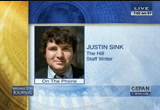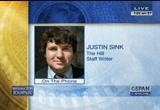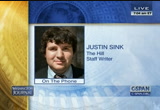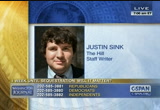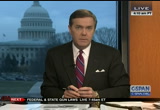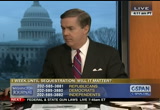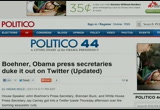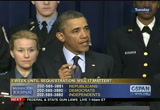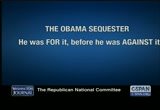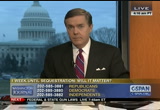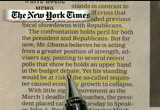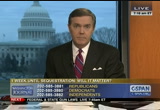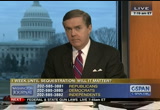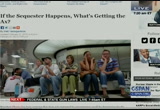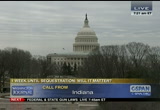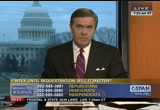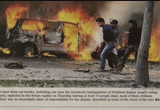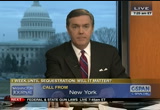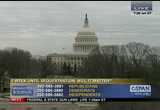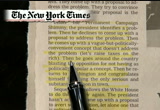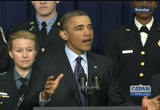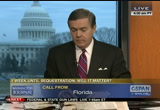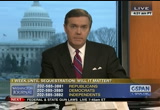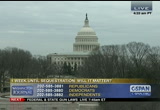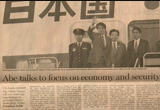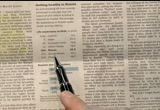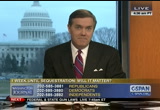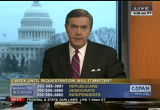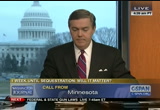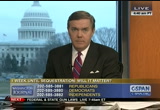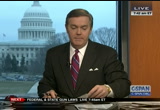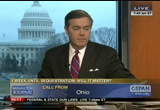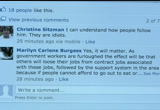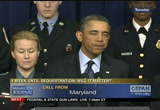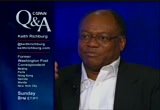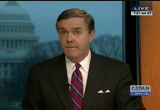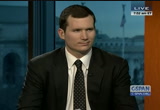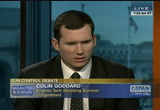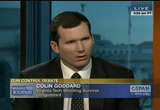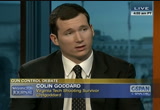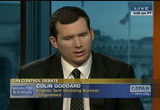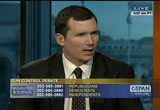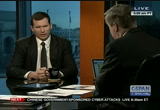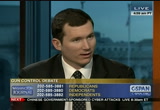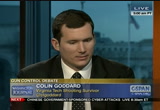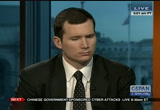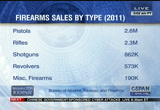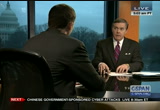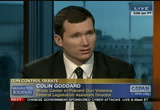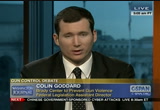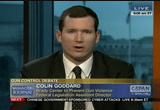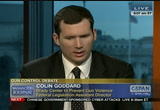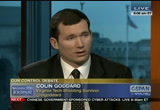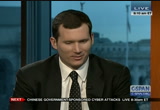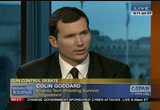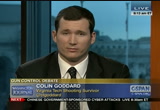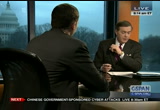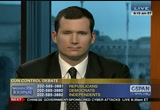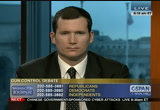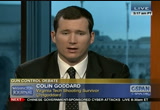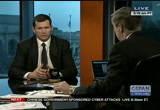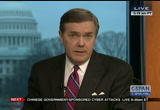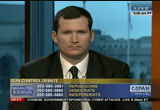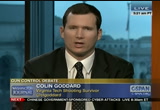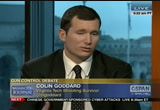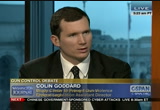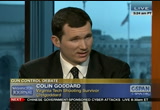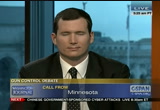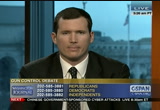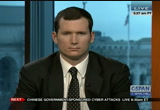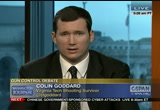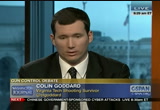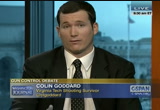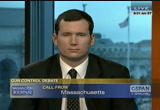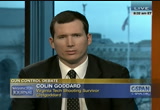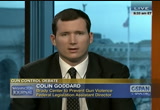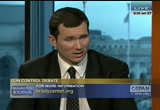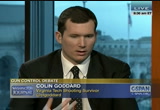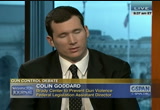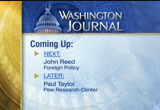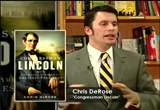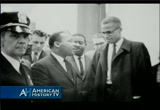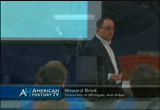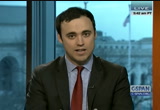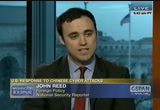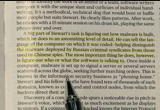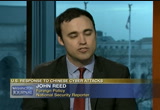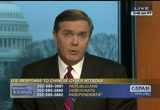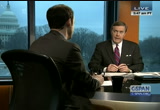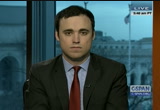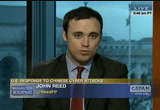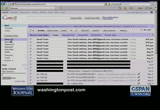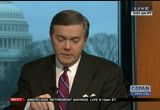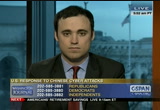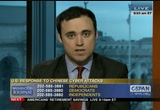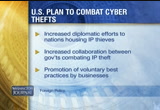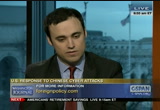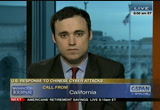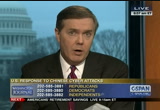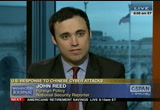tv Washington Journal CSPAN February 22, 2013 7:00am-9:00am EST
7:00 am
john reid on cyber attacks from china. then paul taylor from the pew research center ♪ host: good morning. washington is facing another deadline, those automatic spending cuts that begin to kick in one week from today. one of the headlines from the washington times -- from "the new york times" -- friday, february 22. the president will meet with the japanese prime minister today. u.s.-japanese trade is among the top issue -- top issues.
7:01 am
the league debate on spending, taxes, and budget. that will be the focus of much of next week's debate in washington. one week to do -- one week to go until sequestration -- will it matter? here are the numbers -- join the conversation on facebook and twitter.com. sanders said -- send us an email. what is the definition of sequestration? one is this -- it is that fiscal policy procedure adopted by congress to deal with the federal budget deficit. that is according --
7:02 am
some news over the last 24 hours as the president reaches out to republican leaders in the house and senate. a phone conversation between the president and republican leaders mitch mcconnell and john boehner. our guest follows the story for the hill newspaper. what news came out of these phone conversations? guest: not much from the press secretary or congressional leaders. they have been very tight- lipped. it is interesting to say that things do seem to be heating up little bit. congress will come back next week -- it is unlikely either
7:03 am
version, republican or democrat, of the bill will pass. and will set up for a dramatic week that is unlikely to come towards a solution on this issue. host: how engaged is the president on all this? there have been discussions that he is on the campaign trail, campaigning on sequestration, but not meeting face-to-face with congressional leaders. guest: that has been a frequent complaint from congressional republicans. the president thinks he has the high ground. during an interview with al sharpton, he said, 75% of americans agree that the sequester bill should include both spending cuts and new tax revenues, which is the president's preferred plan. he did a bunch of interviews with local television networks, radio interviews, he had an
7:04 am
event at the white house with the first responders that could be furloughed as part of the sequester, and next week, he is going to a shipyard in virginia to highlight how defense cuts would hit. he thinks using the bully pulpit he can force republicans into a compromise deal. host: we are talking with justin sink. "usa today" poll shows a majority of americans are looking for additional spending cuts and taxes. republicans have said that as off the table. if, as many people expect, sequestration does take effect, who was in the driver's seat? host: i think that is a big question -- guest: i think that is the big question. it will be really interesting. right away, there might not be
7:05 am
obvious hits to the economy, but people start hearing, layoffs will, uh, people will see less money in their medicare payments to doctors. as these real-world costs hit, it will be interesting, and likely what drives the eventual deal will be with the political pressure lands on. host: can you walk us through the next six or seven days? as you indicated, the president traveling to norfolk, virginia, an area have the with pentagon contracts and military construction and the navy shipyards. what are you looking for? guest: the most interesting things will be the votes in the house and senate. if democrats are able to win over a number of republicans to
7:06 am
get a compromise through, that would really upset the equation. it would be very much unexpected. that is maybe our one chance to avert the sequester. more likely, it will be a vote were democrats -- where democrats put forward a plan but fails. then you'll see a lot of finger- pointing from both sides, with republican saying, democrats could not pass of planned. the democrats will say, republicans are the ones who blocked our compromise to be in the senate. -- plan in the senate. there'll be a lot of blame shifting. it will be interesting to see the one side or the other is able to garner a political advantage. host: justin sink from the hill
7:07 am
7:08 am
7:09 am
mean -- good morning. i just wanted to know that sequestration does matter to me. i also found out that congress forgot to put themselves in the budget. i heard that will not hurt them. i wonder why when they did the sequestration, why they did not have their own salaries put into the sequestration? have a nice day. host: ronald from tennessee, good morning. caller: hello? i don't know about sequestration. there are people who do not want to change their minds -- that came up a while back. i think the president has the
7:10 am
right to change his mind if something happens. he says, this is wrong, we are going to change and go some other place. the republicans, they do not want to change their minds on anything. if anybody has a right to change their minds, is the president. host: from the facebook page -- steve joins us from virginia, on the republican line. caller: i wanted to give you good news. a gentleman at ohio state university has perfected clean coal technology -- they utilize iron oxide, and the leftovers are coal ash, water, and iron.
7:11 am
the clash and water can be added to concrete to build roads. the iron can be refined into steel to build bridges. rejoice! host: thank you. we will go to ron in maryland, on the independent line. caller: i am completely frustrated with our congress and senate. we have to cut spending. we just have to. we have to get people that want to work together. we cannot continue with the social programs the way they are. we have to get out of these wars and that are prolonged. this war in afghanistan has lasted longer than world war ii and world war rahman one combined. there is no end in sight. we have to bring our boys home. we have to stop spending foreign aid everywhere that does not
7:12 am
benefit our agenda. host: on our twitter page -- politico is reporting on the back and forth between two secretaries, john boehner's and president obama's. carney toutted the president budget approach -- a balanced approach to the sequester -- to the sequester. there was this a response from brendan but who says -- says -- buck who
7:13 am
you can get more on line by going to politico.com. caller: good morning. this whole thing fascinates me. once again, our president gets a pass. he stands up there and people faced lies about sequestration -- and bold-faced lies about sequestration. he puts up human shields. it turns out he has 100% discretion to what gets cut. he needs not threaten america. he can cut all the bloating and waste and fraud that is going on. nope. he is going to tell us that our houses were burned down and we will die in the streets. he is evil. what he is doing to this country, i do not understand how people can still follow him. i don't know. i do not understand it anymore.
7:14 am
7:15 am
putting the blame on sequestration clearly upon the president, from the republicans. [video clip] >> whose idea was the sequester? >> it was the white house, jack lew and rob nabors. >> i will veto any effort to get rid of automatic spending cuts, domestic and to defense spending. that is why is so troubling that just 10 days from now, congress might allow a series of automatic, severe budget cuts to take place that will do the exact opposite. ♪ host: a republican spot taking aim at the president on sequestration. we're asking you, with a week to
7:16 am
go, does this matter? will sequestration matter to you? scott as on the phone on the democrats' line from michigan. caller: i do not understand why they have not cleaned up our tax code already. i watched erskine bowles and alan simpson -- i have been watching c-span for 30 years. kirsten golston and alan simpson -- or scandals and alan simpson, there are 180 provisions in our tax code that are only used by the wealthy people. i think it is all for the wealthy people to get wealthier. i'm not against wealth. $700 billion a year we spend on the military -- i am very conservative. i think we are wasting an awful lot of our money. i think if we get into our actual budget and look to see what we have, i think we're wasting a lot of our money.
7:17 am
7:18 am
further into the story -- bruce is on the phone, vermont, on the independent line. caller: republicans say, we have a spending problem, a spending problem. mitch mcconnell, he gets up there, he has made about 17,000 speeches adding that we have a spending problem, and yet on the eve of the fiscal cliff deal, he inserted a $500 million gift to amgen, a company that has been investigated for fraud. nobody in the news is saying --
7:19 am
i agree, we have a spending problem. it is the republicans in congress. they keep inserting his gifts to the people that contribute to their campaigns. it is going to dollars and they are giving way to these corporations that are making huge profits. yet we are giving money to them. then there are other corporations that are committing fraudulent acts on poor people, and we are giving money to them. yes, we have a spending problem in washington. if got rid of all of them -- even my beloved bernie sanders -- fire every incumbent. get them out of there. start with some honest people who are not going to make deals. guess what? all that spending will go away. the things that i see here in the last 30 years is that everybody -- the rich's wealth
7:20 am
has gone through the ruth -- through the roof, and everybody else is barely surviving. host: just the rumor of sequestration is affecting the economy. the national journal, according to omb, has what will happen if sequestration kicks in. the story is available on-line at nationaljournal.com. -- the navy has delayed deploying an aircraft carrier to the persian gulf. all aircraft maintenance for the
7:21 am
latter half of the year would be canceled. in the next fiscal year, 100,000 fewer soldiers would serve in the army and army reserve. as we heard from john kerry, humanitarian aid would be cut as well. he says that could have political implications in u.s. foreign policy. the details are spelled out online. we're asking you, will it matter? bob joins us from indiana, on the republican line. caller: good morning. woodward and senator baucas has said this was the president's program. you have a president that comes from the community of organizers, i think that has a hatred of successful people, rather than encourage people to be successful. he wants to tear the top down and bring them down along a level of the lower echelon of
7:22 am
people. that is not right for this country. -- i amknow that people amazed that he got reelected. i have a pretty much given up on things. host: thank you for the call. anne joins us on the democrats line from ohio, good morning. caller: i agree with the caller before about the money interests. i watched a program last night that said health care is the biggest problem. you have companies like general electric -- what you call those -- the mri machines. those cost millions of dollars
7:23 am
-- cost millions of dollars. they lobby and push for this -- that is one of our biggest expenses. i work -- worked for the federal government when they had -- we were offered a one week. it caused some much havoc. it cost so much money for us to be laid off. it was just ridiculous. i cannot figure out why they just did not go slow. most economists say we should not be doing this. 5% across the board? do this slowly. we're not getting to the root cause of what is causing our debt, you know, and the war?
7:24 am
$1 trillion for the war? we cannot spend this kind of money. we do not have the economy to do it. we really don't. with that, i pass. host: thank you for the call. john has this point on twitter, referring to those potential furloughed employees -- another story we want to bring to your attention, on the front page of the boston globe -- as secretary of state john kerry troubles to the region, syria is likely to be topic number one as he focuses on relations in the middle east. the president will be traveling to the west bank and israel in late march. dold joins us from new york on our independent mind. caller: i loved c-span and c-
7:25 am
span radio. sequestration and debt ceilings and fiscal cliff, it is obvious we have a weak leader. what is next? we've got four more years. host: thank you for the call. military cutbacks are the focus of this story -- mike is joining us from utica, n.y., on the republican line. caller: they are all cowards and washington. this sequester is never going to happen. the country needs tough medicine. the cowards are led by the cowered in chief, who is dying
7:26 am
in side -- inside. he is like a wife spending out there -- they have wives up there instead of men. this is like mediscare. what happened when our bond rating went down? the same thing -- a goal they stop spending, nothing will happen, except they will save the country. -- if they stop spending, nothing will happen, except they will save the country. when they kick the can, they should be ashamed of themselves. it is a shame that they cannot stop the spending. the republicans have obama on the hook. he is the one -- he is dying inside because he is a spender. for him, this is the worst week of his life. they do not even see it. it is ridiculous. they are going to kick the can down the road once again.
7:27 am
host:, for the call. a lot of people expressing their views on our twitter page. we encourage you to share in the conversation. one saying sequestration is that incompetence and politics as usual will eventually buy to in the rear. if you're listening on c-span radio, we're asking you, one week into sequestration, will it happen? from this morning's new york times, david brooks writes about the d.c. dubstep --
7:28 am
the blame game continues. the republicans say this was the president's idea. the president had this to say -- [video clip] >> congress passed a law that a global parties cannot about -- could -- cannot come up with a planned to avert the $1 trillion, arbitrary budget cuts would start to take effect this year. the whole design of these arbitrary cuts was to make them so unattractive and unappealing that democrats and republicans would get together and find a good compromise of sensible cuts as well as closing tax loopholes and so forth. this was all designed to say, we
7:29 am
cannot do these bad cuts. let's do something smarter. that was a whole point of the so-called sequestration. unfortunately, congress did not compromise. they have not done their jobs. as a consequence, we've got these automatic payroll spending cuts that are poised to happen. if congress allows this meat cleaver approach to take place, it will jeopardize or military readiness, it will eviscerate job-creating investments in education and energy and medical research. it will not consider whether we are cutting the bloated program or a vital service that americans depend on every single day. it does not make distinctions. host: in this from twitter --
7:30 am
in politico -- this story availabel at politico.com. obama has been virtually absent from the legislative process, pointing out that he is navigating a very thin line. back to your calls -- fred joins us from florida, on the democrats' line. a week to go before sequestration. do you think it will matter? caller: yes, it does matter. it is like this -- it is a matter of simplicity. if we are going to go ahead, we are going to go ahead together as a nation. if we allow the rich to
7:31 am
dictate all of what is going to happen in this country, and the poor will suffer. if the poor dictate all, then we will suffer again. however, the problem is simple -- congress and the government are complicating this matter by simply not coming to a negotiable agreement that would help everybody. host: let me stop you there. how do they get to that point? caller: they are not going to except the reallocation of revenue in this country. we cannot take something that somebody has already tried to establish for themselves in a free society. however, a free society is not free if everybody does not bring
7:32 am
7:33 am
gio is joining us from virginia, on the independent line. good morning. caller: this is another fine example of the congress and our politicians in washington d.c. -- washington, d.c. being out- of-touch and looking out for themselves to get reelected. onear as i'm concerned, thing we do not need to be happening is cutting our military spending with the situation with north korea and china and other countries throughout the world. as a retired civil service worker who worked in that
7:34 am
industry, i know for a fact that when you're putting money into military spending, your defense spending, that is when your manufacturing increases and the economy is at its greatest potential. your creating more and more jobs all the time, because all the aspects that go into defense are there. host: a photograph of the japanese prime minister as he departed from tokyo in route to washington, d.c., writing for meetings last night, including -- arriving for meetings late last night, including one with the president. he served during the latter years of the bush administration and came to the u.s., focusing on trade and economic issues. speaking of asia, there are a couple of other headlines we
7:35 am
want to share with you. from the new york times -- speaking of russia, a story inside the washington post, getting a fair bit of attention -- japan as number 3, 83 years. the u.s., 51st, 78.5 years. russia is 164, with the average life expectancy of 66.5. as you can see, a lot of young russian women smoking, which is prevalent throughout the
7:36 am
country. president putin saying, it is time to cut smoking. roger joins us from missouri, as we get back to your calls and comments on sequestration. one week to go. will it matter? caller: hello, sir. how are you? at 48 years of age, i was 100% disabled. for me and others like me, how was it going to affect that part? host: will you be impacted, do you think? caller: i'm curious. host: what is your biggest concern? caller: if they cut off my funding. host: what is your wife saying? caller: if the cut the pay check off. host: the biggest cuts will be
7:37 am
to the military. most of the social programs will not be harmed. thank you for the call from missouri. from the twitter page -- another look at another set of numbers. hillary clinton, now the former secretary of state, she signed up with a walker agency, and we're taking a look at her speaking fees. here is a quick rundown. she is likely to make in excess of $200,000 per speaking agent through the head -- through the harry walker agency. her salary for secretary of state was $186,000 record -- $186,000. the salary of president obama, the same since 2001, four
7:38 am
hundred thousand dollars. you can read more by logging onto washingtonexaminer.com. nikki, from alabama. will sequestration matter? caller: how can the republicans say that sequestration is such a big concern to them, and they have taken it, and they have gone nuts tied up in all of these wars, and then they come back and they use this lie about how they are angaged? -- engaged? we do not need this. i'm just wondering, what is it that there really want? host:, for the call. inside the washington times -- thank you for the call. inside the washington times --
7:39 am
we could see a vote on that early next week, which means he could be sworn in by the latter half of next week. leon panetta, returning from brussels, maintains his position as defense secretary until chuck hagel is confirmed by the senate and sworn in by the vice- president. rich joins us from minnesota, and the independent line. caller: 3 parts. -- first of all, i agree with the gentleman from earlier, in reference to this getting stupid with the current war. we are in excess of world war
7:40 am
room and one and world war ii together. i would caution america that we are not having wars on words, instead of wars that are actually things. we're getting out of control. number two, as far as the blame, all of them are to blame. we have checks and balances. the executive and legislative branch are both to blame. number three, to answer your question about the sequester, and how it will affect us, yesterday, you guys ran a story for news broadcast of a host have been the sequester meeting. how that would impact the military and stuff like that -- the defense secretary stated that while the sequester is not going to affect me at all, and one of the congressman said, you know, the sequester will affect the rest of the nation, i suggest that affect all of us
7:41 am
to. i think it really should. i do not think rest of the nation should be affected, and the people that are causing sequestration not be affected. that is insane to me. host: where are you in minnesota? caller: just north of grand rapids. host: hit by the snow? caller: we are used to it. host: with an eye on 2016, a couple of political notes for you, first in the washington post -- a lot of speculation on maryland gov. martin o'malley. the piece points out that he is traveling to a number of key states, including iowa, as he looks at a possible 2016 presidential bid. meanwhile, one republican senator says he's not interested
7:42 am
in running for president. that story is roll-call -- from roll call -- he says, i do not plan on running for president. being president is a very, very hard job. back to your calls. virginia is on the line from ohio, the republican line. caller: i just wondered the people really realize how many millions are in $1 trillion. host: a lot. what is your point? caller: their 100 million in $1 trillion. how many zeros are in $1 trillion? host: i don't know.
7:43 am
the sequestration is $1.20 trillion over the next decade. $85 billion in automatic spending cuts would kick in next friday. we will go to joan and next. good morning. caller: hello. good morning. how're you? to the lady that just ask you about a trillion, the president has already cut $1.20 trillion and give it up to the people already. -- gave it up to the people already. you read your paper -- i have one paper a want to read to you. you rich men, we holler for the miseries that come on you. you have stolen from the house
7:44 am
of labor square rip down your field. they try to still the people's social security checks, people's money, and if anybody in good ith but this government use the money for 40-50 years and you cannot get a return on your investment -- everybody asks all these questions. why don't you ask how many of those republicans, how many republicans have money in the war effort and keep starting these stupid wars? host: thank you for the call. marilyn on our face a page -- facebook page -- join us online at facebook.com/cspan. matthews joins us from maryland,
7:45 am
on the independent line. caller: how're you? basically, all i want to say, first of all, the president would not have to have come up with the idea sequestration if we had a competent congress that could pass a budget on time. if you look in the past several years, what has congress actually passed a budget on time? it has been years. it always comes down to the last week or two weeks. congress takes a break. everybody gets upset. they think, how can congress take a break in the midst of such a dire situation when the country needs them? at the last minute, they swoop in, and they make a last-minute decision, and they come out, and i don't know if they think they look like heroes, but they're really don't.
7:46 am
congress needs to do their job. they need to pass a budget on time. host: go ahead. caller: for congress to turn around, republicans, not an saying, this is the president's idea, is another political tactic to say, we should not have had this president in office in the first place. he comes up with ideas. some of the previous callers have said that. this was passed by congress. it was signed by the president. every act, everything wrong with this country boils down to congress, not the president. i am not saying the president does not play a large role, but it is congress. host: we will stop there. thank you very much for the call. one of the movies that has been
7:47 am
talked about is "groundhog day." this is the fifth deadline between this president and republicans before they took control the house in 2011. you can read more from this morning's wall street journal. it is online at wsj.com. big bird is back. he returned to the white house. this is a 30-second spot featuring the sesame street character -- for a we're looking healthy snack to eat. >> you can get anything you want in this kitchen. >> eanet what i like to reach for? healthy, colorful snacks like to
7:48 am
seaford's and crunchy vegetables. if you are really on the go, some come in there on the carrying cases, like this orange. it has a hard pill. >> -- peel. eating healthy is easy and fun and delicious. >> the latest from pbs. 300 television stations will be airing the new spot, part of the first lady's third anniversary of the law new campaign. "washington journal" will continue. colin goddard is involved in the british campaign. john reed taking a look at china's cyber attacks, the impact in the u.s., and the u.s. response. "washington journal" continues for this friday, february 27 -- 22nd. we're back in a moment. ♪
7:49 am
>> at age 25, she was one of the wealthiest winnows in the colonies. during the revolution, while in her mid-40s, she was considered an enemy by the british to threaten to take her hostage. later, she would become our nation's first firstly at age 57. meet martha washington monday night in the first program of c- span's weekly series "first lady's." will visit some of the places that influenced her life, including colonial was -- colonial williamsburg, valley forge, and philadelphia. the part of the conversation with your phone calls, tweets, and facebook posts, live monday night at 9:00 eastern on c-span. >> think it is pretty accurate
7:50 am
that they do not play by the rules in most cases. i think they bend the rules to fit their circumstance. i think americans and westerners tend to be more legalistic. we want things on a contract. once we see things written down, that is the be all, and all, whereas the chinese will sign any contract or agree to any trade agreement, and the minute the ink is dry, they will figure out a way to interpret it to get around requirements. >> where does that come from? >> it is a relentless drive to try to get ahead. it has built the place over the last 30 years. the want to get better, to improve. they see some of the constraint -- some of the constructions we have put on them as trade. they see that as we are holding chinatown. we basically operate in a role -- in a world without rules. now that we have gone to the top, we're try to hamstring them
7:51 am
or tie them up with a lot of rules and regulations to hold them down. >> teeth which bird on a 34 years of reporting -- keith richburg on 34 years of reporting for the washington post. >> "washington journal" continues. host: today, we focus on the gun issue. we heard from gun rights advocates. today, we want to hear from one of the shooting victims of a virginia tech in 2007, somebody vice-president joe biden that in his hearings in advance of the white house meeting on january 16 with the president's proposals and recommendations on ways to curb a gun violence in the country. the vice president in attendance. [video clip] >> we met with a young man here
7:52 am
today -- collin was one of the survivors of the virginia tech massacre. he was in the classroom. he calls himself one of the lucky seven. he will tell you he was shot four times on that day, and he has three bullets inside him. when i asked colin, he said, i am not here because of what happened to me. i am here because of what happened to me keeps happening to other people. we have to do something about it. colin, we will. colin, i promise you, we will. host: the vice-president last month. we want to welcome colin goddard. let's go back to april 2007. what happened? guest: it was a monday morning,
7:53 am
french class. a dreadful power. i got a class. things were normal. about halfway through class, another girl in our class came in late. this was one of the students in the class. when she took her seat, which -- we said, what gives? she turned around and said, there was a shooting in my dormitory. the whole building was on lockdown. they would not let anybody come or go. they finally said, you're free to go. we looked at her like, what? there was a shooting? we have not been told? the school year started with the shooting around blacksburg. the canceled classes pretty quickly. we thought we were ok. it probably wasn't five minutes after that when we heard a loud bang come from somewhere within our building. there were doing construction adjacent to hours all semester, and we heard all sorts of
7:54 am
wheeler -- weird noises. seconds later, they got much louder and closer. you could tell it was something in our hallway. immediately as soon as she open the door, she slammed it shut and she said, everybody underneath the desks. somebody call 91. -- 911. i give up my information of where was. i said, i think there is somebody shooting in this hall. we saw bullets coming through our door. at that point, everybody hit the floor. that was probably the longest 10 minute experience of my life that followed. for me, it felt like ours a constant gunfire. it was after that that i did not see what was going down, but all the sudden, i felt like somebody had kicked me as hard as i have ever been kicked above my left knee. that feeling faded into this burning, stinging sensation that faded into this witness, warmth,
7:55 am
and then it went numb from head to toe. it was at that moment when i felt the sensation. i smoked a propellant, which to me, smalt like fireworks. i just realized, i got shot. this is real. the rest of the time is kind of a blur. i was conscious throughout the experience, but i do not quite remember everything six years later. at the end, i knew i had been shot three more times. twice in my hips, once in my shoulder. the last time i was shot was probably one of the last gunshots i heard. you could tell police entered the building. my phone call was one of the only ones made from the rims with victims. when i left the phone call, a girl right next meet ducks -- picked it up. i expected the police to engage, but they said, shooters down.
7:56 am
they began it rehash of the students, try to plot the injured ones. i heard a black hat, black tag. i realize that some of my classmates were dead. they pulled me out, got me into an ambulance, i got to the hospital. our campus was full. they drove me down to roanoke. i spent six days in the hospital, a couple months in physical therapy, and ultimately went back to virginia tech, just like every injured student. host: what about your french teacher? guest: she was found behind our classroom door. she was probably one of the first ones shot. it was probably the most difficult loss ahead. most of my close friends were sitting next to me, so all seven people in that room 17, we survived. where were located in the back corner of the rim. for my french teacher, she was the first target.
7:57 am
host: you then graduated. a couple of years later, you're watching on cnn another shooting that took place in up -- upstate new york. what was your reaction to that? guest: that was almost two years after the shot -- after the shooting i had been involved in. i have learned a great deal about how the situation i was involved in king to be. how the school knew the student, the mental health policies, and gun policies, how this person was allowed to buy a gun, despite having the federal record that prohibited them from doing so. he had a mental adjudication. i had not seen other shootings. i cannot watch them. -- had not watched them. i cannot turn away. i watched the news unfold and i thought, this is how the whole world saw what happened to me. now i am seeing it happen to
7:58 am
somebody else. yet, we change nothing. there have been no progressions in terms of gun policy or mental health policy. what gives? the end of that day was my pivot point. at that point, i said, look, i have to do whatever i can to address this issue. i became involved with the british campaign and have been involved ever since. -- the brady campaign and have been involved ever since. host: the nra has argued that if we had guns in the schools, that would prevent some mass shootings. your thoughts? guest: the only thing i knew that morning was that i did not know what's going on. i do not think we should be taking our for step how to reduce these kinds of shootings at the last possible second.
7:59 am
we did not even do background checks -- we do not even do background checks and never done in this country. i was shocked. terrace so much we can do it in advance to stop a person with mental ness and the gun, together in the first place. i do not think americans are going to shoot our way out of the shooting problem. we have to look at other ways. we need to keep dangerous people away from guns to begin with. host: a couple personal questions, before we get to your calls about gun violence and the debate front and center in this country. did you return to the classroom? guest: i did. that was difficult, to try to return to the classroom and not free out whenever a kid comes in late or somebody slams the door. it was taught in the beginning. ultimately, after that last year, i was somewhat
8:00 am
comfortable. i always think of my exit when i go into a public place. that is a piece that has forever changed. i graduated happy hokey. host: how did it change the campus? guest: it brought the community together. a lot of people were expecting students to transfer and not to have a large incoming class. i think the opposite happened. my sister who was going to go to a different school applied to virginia tech and chose a virginia tech as her school. she is there now. i know there is a new wave of student there. they are not the ones who were there when i was there. people still say to me when i wear my virginia tech t-shirt, were you there? it has been a bad mark on our school. i think there are so many good things that have spawned from that that our school will be known for the legacy we leave afterwards and what we have
8:01 am
chosen to do after the fact. host: a question from 20 on twitter -- guest: i have made a full recovery. i think that goes a long way to help my mental and emotional recovery. i can do everything i did before. i went skiing a few months ago with friends. there are some people who cannot do those things, who wake up in the morning and see a different face in the mirror. they are in a different place. i feel really fortunate, really lucky to have the recovery i did. i think it allowed me to get to the point where i can become an advocate for changes in this country and to be able to share my story with people like you and your viewers. host: what you think we have had a series of mass shootings, aurora, it is newtown, or oregon? host: you could probably write a book. i think part of it has to do
8:02 am
with the easy accessibility of firearms. there are many -- too many people who leave their guns accessible to mentally ill people or children at home. there are not complete back contracts. those are two areas of the system that i think we need to improve. that is why i wanted to work with the bri campaign. there are a lot of factors -- the brady campaign. there are a lot of factors. host: let me share with you and our audience these numbers -- these are 2011 numbers from the top -- the bureau of alcohol, tobacco, and firearms. pistols, 2.6 million. 2.3 million rifles. a hundred feet -- 62 -- 862,000 shotguns. 573,000 revolvers.
8:03 am
what do these numbers tell you? guest: we in america like to buy guns. it has been part of our culture and tradition. i understand that. i was an army cadet for the first two years of school. i have been hunting with my buddies. i have been to the range even more, and will continue to do so for the rest of my life. i think there are some simple changes, and in doing the background check on every gun cell, that i think will go a long way to keeping the second amendment for the people it was intended for and keeping guns out of the end -- of the hands of people who should not have been in the first place. host: this came up yesterday in our conversation with emilie miller, who had to go through an extensive process of purchasing a gun in washington, d.c. you have different patchwork loss. maryland is different from virginia and new york. pennsylvania is different than upstate new york. you get the point. you can travel across borders
8:04 am
and see different laws. host: that plays a part in the problem, why the vast majority of guns in washington, d.c. or new york do not come from that area. they come from places where it is easier to acquire. they are shipped and brought in through the illegal market. that is why we need federal standards when it comes to background checks so that you cannot go to state, or 30 minutes down the road, and avoid a backer check completely. that is why i am here in d.c. and your congress to hopefully bring about some change with some many other good people. the really missing piece has been american public engagement. we need the views shared with public officials. they do not think we really care about this. that is why they have not done anything. we need to fundamentally change that paradigm. host: we are speaking with colin
8:05 am
goddard, a shooting victim in the 2007 incident that took place in april of that year. he is now involved with the brady campaign. caller: good morning. god bless the young man going on with his life after such a tragedy. that it calling to say have a driving license, and if i can stop in the state of south carolina, they can pull up my record so that no matter what they seem to think, they can do something like that with a gun laws. when people go different places to drive, they can pull up the record on the computer. host: thank you for the call. guest: i think she brings up a great point. before you are allowed to drive a car in public, you have to be licensed, and have to register your automobile, and you have to prove that you're certified and competent. unfortunately, we do not do with
8:06 am
that -- we do not do that with firearms. i often hear the comparison between deaths by automobiles and firearms. we have done a great deal in terms of deaths by on moabite -- on a mobile -- automobiles. we've not done the same with firearms. great question. host: a question from one of our viewers -- guest: a dangerous person has nine or 10 categories consisting of people with felony records, domestic violence restraining records, dishonorably discharged from the military -- when it comes to mental health, those who been adjudicated to be in danger to somebody or themselves -- there are specific categories. if you fall into one of those,
8:07 am
the fbi does the background check, they are the one the process your records to make sure that you're not lying on the form when you apply to buy a gun -- those of the folks that either give the red light or green light. host: at the event ungenerous 16th in which the president outlined his agenda items, here are the bullet points -- with all of this, what is likely to pass? guest: everything is on the same page. we tried to talk about every single part of this proposal. we realize there is not just one thing we can do or one solution to gun violence that is going to save everybody's life.
8:08 am
we need a comprehensive set of laws and policies in place that legitimately take seriously of keeping guns out of hands of people who should not have them. initially, we're hearing there may be senate movement. this process will continue. we think everything is as equally as important. we need to do everything we can. we need to have a comprehensive approach. host: since the virginia tech shootings, universities have invested in warning systems and processes for their faculty, staff, and visitors. can you point out what changes you saw assault 2007 -- from april 2007 to your graduation? guest: it was a game changer for universities and colleges, when it comes to how they provide physical security. for example, they do not allow
8:09 am
-- they put locks on doors from the inside. the change the handlebars city cannot -- so you cannot chain them up. we have an emergency alert systems. that actually run drills and have created a threat assessment teams were the have faculty members, members a lot -- members of the mental health community involved in identifying problem students and making changes they need. we have done a good deal in terms of improving our school security. we have done nothing in terms of improving or firearm security and making sure guns are not falling into the hands of those who should not have them. he host: the nra raising in excess of $1 million, one of the best fund-raising efforts ever. they're also seeing a record number of new number -- new memberships to the nra. does that surprise you? guest: people are drawn to both sides. we have seen similar significant
8:10 am
donation increases, the chapter's starting up. it has been a phenomenal what portion of support we have seen. two months later, we try to get back to people now. keep up. -- keep it up. that is great. when people see these events, they do not want to happen to them. this should people's humanity at the core. this was a personal tipping point, kind of like my situation was. sandy hook was the tipping point for a lot of people. we're still having conversations about our gun policy a few months later. host: one tweet -- guest: i have been up here for three years. it is crazy city. i am in this for personal background checks. i think that makes the most sense.
8:11 am
i think it is so common sense. most people think we already do. the might be shocked to learn that we do not. i'm here in d.c. with that objective. when we achieve that, i will go into something else. i would like to work in the state department, in the foreign service overseas, but the mountain in front of me is big enough. i'm staying on focus. host: you faced multiple bullet wounds. you still have some in your leg? guest: pieces in wide-body, -- in my body. in my paul buss -- pelvis. fortunately, i have not been in much pain. i am a volleyball player. make a good recovery. it has allowed me to engage in this work. host: have you felt different since the shooting? guest: that is one question i
8:12 am
get a lot. most of my high-school friends probably think i was the same young guy. one thing i noticed is movies and films, especially with violence -- a disconnect when i see, particularly with gun violence. i think about, how did the director choose to portray this? did they show the intense, gruesome reality when the bullet enters the body? then the emotional part in movies, that gets me. i'm getting choked up. that is one thing where i have noticed the biggest change. physically, i have some scars, but i'm a pretty much the guy was before. caller: good morning. host: good morning. caller: i have a question for this young man.
8:13 am
first of all, i'm sorry you had to go through such a horrible thing. if you were there and you had been alarmed at that specific time, would you try to stop that guy from shooting everybody? guest: i have thought a lot about that. i think it is natural to relive the situations in your head. i have done it every which way i can imagine from the saving the day to me getting killed. a cut of realized that i did not understand what was going on. the moment i have a clarity was when i was shot and my leg was broken. -- i had clarity was when i was shot and my leg was broken. i'm not certain that i would have been effective, even with my army rotc training. i think we should stop things in advance. host: what was typically a
8:14 am
routine day in april, would you have even thought about carrying a gun in the classroom? guest: know. college campuses are one of the safest places you can be in this country. people aged between 18-24 are one of the constituencies that are least likely to ever hit by a bullet. if you live anywhere else, that percentage goes a lot higher. we're talking about mass shootings. we need to the day-to-day incidents with firearms, with that, displacement, accidental shootings, and confusion -- we're not having those in this debate. it is going to make the average dividend college life more dangerous than it currently is. host: host: you talk about the french teacher who was killed in the shooting.
8:15 am
the what is her legacy? guest: her husband has taken that physical space of norris hall and turned it into a center for peace studies and violence prevention. talked-about taking it -- taking something-and turning it to the positive. i mean, the man works in the same space for his wife was killed. it's phenomenal what he has done and what he has helped create. i admire how he has been able to internalize something so bad and put it to something good. host: rick your joining us on c- span eggemeyer we are talking to colin goddard, he was one of the virginia tech shooting victims. we're joined by our caller. caller: good morning.
8:16 am
i am archbishop kevin mcdougal and i have been -- people do not understand. i go into hospitals and i have seen mothers grabbing the in -- grabbing me, saying, would you please which i sent out? -- would you please wait my son up? i have been in the emergency room and six people were shot at one time and they would not even let the priest in. guns have got to be stopped. i do not care how you stop them, but they have got to -- there has got to be an end. what about the guy in the theater? it was dark. if everybody had a gun, they would have shot.
8:17 am
the only person who did not get injured with him. he had body armor on. host: thanks for the call. guest: unfortunately, the caller has seen the gun violence. you see the horrible plight of families that go through something like this. if more americans did, we would have a very different conversation going on right now. if people saw what i signed my classroom or what the classrooms at sandy hook look like. these people who go out violently, whose bodies are ripped apart, this is an intense situation. more people need to do the work that you are doing and see the reality of this problem and will come to realize that there is change that we need. host: the issue of background checks is the subject of a story
8:18 am
in the "denver post" this morning. guest: it is a big problem. we have a background checks that applied to some dealers, but not all. we need to make improvements as a joke duration -- improvements in the system by making sure that the states are sending their records over to the fbi national system. if we did that, and we made sure that every record was in there, but we do not require one to go through a background check, then where we doing? -- than what are we doing? those are so common sense, low hanging fruit issues. that is where we need to come around on this. it should have been done years ago.
8:19 am
host: you talk about the shooting in 1999 in binghamton, new york. this is one of the things that woke me up. was newtown a game changer? guest: resign mass shooting in colorado, -- we sought a mass shooting in colorado, in ohio, and i think sandy hook was the last big crescendo in gun violence that year. it was a ticking. for a lot of people. it is horrible in some ways. it is -- why does it take something so bad to start a conversation? but here we are and let's do something with this. host: joining us from florida, good morning. caller: the next time i hear someone say man out, i will say,
8:20 am
grow up. the problem is the guns. the people who hold the funds should be getting a background check. we have 40% that do not have any kind of background check. i worry about that. to many americans resolve issues with gun violence. and they're not all criminals. they're people who cannot control their impulses, domestic violence perpetrators. we have a stamm york -- a stand your ground law he in florida. it's kind of like man up. talk about childish. florida has turned into the wild west. people should if you even look at them cockeyed. and they used to stand your ground law. it has got to stop. i worry about the children who accidently injure or kill themselves or another child wit guns were left unattended. thonservative media was outraged when the new york newspaper published the
8:21 am
addresses of permitted gun holders. i'm a grandmother. i would want to know before my child visited the home of an irresponsible gun holder. guest: i think the caller brings up a lot of great. . between -- a lot of great ideas there. between the laws that we have state-by-state and federally, it is very aggressive. it does not help us to promote the idea that we're all americans and live in a community and we are neighbors. after we have all of these horrible instances people say, all you can really do is get a gun and protect yourself. it does not promote the sense of community. if you have an issue, i need to help you in some way and not just ignore you and say, i'm not going to worry about that. that is not a good mentality.
8:22 am
splitting to many of us up into many factions. -- it is putting too many of us up into factions. unless we change the culture and the social norms around guns and making sure they are stored safely, making sure that we keep them out of the hands of dangerous people to begin with, then we will seek a reduction -- we will not see a reduction in violence. host: did your parents have a view on gun violence? guest: my parents raised be overseas and have always told me to leave the world better than you found it. with the british campaign to prevent gun violence, trying to do my keys -- with the brady campaign to prevent gun violence, i'm trying to do my keys to leave the world better.
8:23 am
and trying to find some positive way to engage. host: from our twitter page, joe says, you are onto something with regard to hollywood. are you taking aim at the movie industry? guest: we need to look more at how violence in our films and our games and their music -- and our music is affecting our population, especially young people. i do not think that we should curb creativity, but i think that we need to understand young people at a young age should not be exposed to the credit crunch and that they're exposed to now. parents who do not -- to the kind of content that they are exposed to now. parents who do not monitor their children, if they saw what that creases on the emergency room, things would be very different.
8:24 am
in reality, we need to realize that the twitch of a finger from a little child can and the life of a grown man. we have to take that more seriously host: in your case, did you see the face of the shooter? guest: i did not. i took one glimpse at the front of the classroom and i saw a pair of boots, khaki pants, and a white shirt, and two holsters over his shoulders. because of the way he was walking, he looked like he was about to exit. my first thought was that he was a policeman. instead of walking out of the room, but i thought he was going to, he turned down our row of desks and shot. host: why was he there in that hall? guest: i do not know. i know he had glasses there. it was one of the few academic
8:25 am
buildings that had only three big entrances and exits. he was able to chinos up before he began -- he was able to change those oup before he started shooting not only did he keep people from fleeing, but he was able to keep the police from entering. it was a much more controlled environment that he was familiar with. that is my opinion of wine norris hall was chosen. host: our next caller, nancy, on the republican line. caller: mr. goddard, you have such good visibility, i would like to run anhost: idea by you, being a grandmother and the next
8:26 am
school board member. i shudder every time i see this invitation at the door that says guns-free zone. i do not know why it was always badly interpreted. why has that always been interpreted wrongly? i know a sign painter and i'm going to take some signs around to our school district and our in -- and put a sign right under the gun-free a zone that says, d "this means you, not us." they're talking about putting the police department in an elementary school. i think that sounds great. a few people, very qualified people could be armed. not the whole classroom, not even your whole classroom at
8:27 am
virginia tech. but we have to clarify this sign out there that says it is a gun- free zone. this means you, not us. what do you think of that? host: as a former board member, did you debate these issues? caller: no, we never did. we never thought of anything so horrible. but i go by a little bitty town and they're always thought that this would be a really big calamity. no one has ever heard of it. the other thing i would like to run by you is a test at our schools. having the elementary and junior high and high school all in one
8:28 am
block, isn't that neat and tidy? i think it is terrible. host: thank you. we will hear from our guest. guest: i think she brings up a good idea. there are places like schools or government buildings or churches that should be allowed to decide what their policy is. it was good to see in the president's package that there's more money to have school resource officers and armed security guards where needed. and that makes sense. but we can do a better job that we are currently not doing, namely through background checks, for example, to keep dangerous guns out of hand of dangerous people. background checks do not prevent any law-abiding citizen from owning a gun. the way they are designed, good, decent americans pass every time they take it. but some with a restraining order or a mental illness come out that information needs to be
8:29 am
fired. it is difficult to make any progress and save any lives at that point. host: this from one of our viewers -- with background checks have stopped the virginia tech shooter? guest: he took two background checks. once he was committed against his will and was in front of a judge and was adjudicated to be a danger to himself, that decision right there prohibits you from purchasing firearms. fortunately -- unfortunately, the decision after that was to get outpatient therapy rather than inpatient therapy and that was the reason why virginia did not send his medical record over to the background checking agency. one simple decision could have altered a series of events that day. something so simple as approving
8:30 am
of background checks and making sure that all records are there could have gone a long way. host: another story in the front page of the virginia private, strong laws. those would be imposed if you purchase a gun and then give it to someone you use it violently. -- who uses it violently. guest: it is difficult to track and to prosecute, but people need to understand we have no federal contracting laws on the books. it just does not exist. to enforce the laws that we already have on the books, that felons should not have firearms, the mentally ill should not have firearms, and forcing the army as a background check must be done.
8:31 am
-- enforcing that law means a background check must be done. and host: richard is joining us from massachusetts, independent line. caller: how are you today? host: good morning, richard. caller: i have a couple of points i thought i would run through quickly. you do not always. any debate. bear with me. one thing that does not seem to come up very often is that all of the shootings have happened in gun free zones and that there have been a great number of people whose lives who have been saved because they had guns. you do not often hear that on the media. also, chicago, new york, and boston, which have some of the tightest gun-control laws in the country, have the most violence. i will finish off by portilla
8:32 am
that a -- finished off by pointing out that dianne feinstein wants to remove all guns from the american people, she says, except for the military and police. the countries that have done this in the past are germany under adolf hitler, russian -- russia under stalin, and now sits on in china, these things led to the -- and now it's a town -- mai tse tung in china. millions of people lost their lives in the circumstances. guest: i have heard the comments that richard made, made before. certainly, the shooting in tucson, ariz., was not athe coue
8:33 am
this in the gun- free zone. the shooting just yesterday las vegas was not a gun-free zone. they happen everywhere. unfortunately, the conversation that we're talking about, background checks for example, making sure they are down on everybody, get extrapolated to this degree that ultimately, this will result in people getting their doors kicked open and having someone take their guns. that is not the conversation at all. that is not what any of these bills or legislation will do it is unconstitutional to do that. we have the decision that you cannot ban guns. i think that is a great decision. it removes the extreme position that everyone is quite drop their guns taken away. setting background checks on all gun sales is a good way to move forward. host: one man says, his advice, by a shotgun.
8:34 am
guest: biden speaks in a very frank manner. it shows that even the vice president is not opposed to buying firearms. he understands that there are legal gun owners all over this country. many of them have told us that they support background checks on all gun sales. we have seen polling that shows seven out of tend nra members as well support background checks. nine out of 10 americans. these are reasonable grounds that we're gaining a consensus on. we need to get progress in this country. host: the christian science monitor's looking at guns in america and pointing out this figure, that when it comes to win it -- of overall deaths, in 2011, the fbi reporting 323
8:35 am
murders committed with a rifle compared to 6000 to wonder 20 committed with handguns in the u.s. -- 6220 committed with handguns in the u.s. guest: right, something very small and easily concealable can be used in more crimes. we should look at the weapons that we sell to the general public. i was shocked to see some of the guns i could buy at banjo's around the country. guns that i thought that had no place -- and i could buy at the end shows around the country. guns that i thought had no place on the street. when i learned that there was an ar-15 with a 100-round drum used in that movie theater in colorado, i was blown away. as a military weapon. there's no place for that anywhere in our country in civilian hands appeared to be able to shoot 100 rounds without stopping has no common purpose for practical self-defense for
8:36 am
hunting or sport shooting. that is an accessory bill to kill as many human beings as possible. we need to take a hard look at the guns that we sell to the general public. host: final question. you were on the way to the hospital on that april morning and then recovering for several months in the hospital. what was going through your mind? guest: just trying to find some sense of more normalcy again. everything gets turned up side down. you have to revise things will never be quite the same way as they were. but with -- you have to realize things will never be quite the same way as they were. but with some work you can find some sense of security again, some sense of purpose, some sense of comfortable nest in this country. the work that i've been doing with the brady campaign, that has been a way to continue talking about this issue and not keeping it inside, you know,
8:37 am
getting it off my chest, as well as taking this bad experience and channeling it toward something good. it was not just me that got me involved. it was because i saw happening to other people and nothing being done about it. i'm here in washington to ask people to help me get something done, so we can see substantive change in his country and the reduction of the number of people shot and killed. host: in your classroom, how many students were in the class? how many were shot? and how many killed? >> 17 people in the classroom, including my teacher, and i'm one of seven still alive. there were 32 people killed that morning. about another 19 or so injured from gunfire. and another three or four injured from jumping out of seconds for windows and breaking their legs or ankles on the way down. and there were many more that i consider emotionally injured.
8:38 am
we changed the community. for anyone who deals with hardship in their life or anything new comes out of left field entered their lives upside down, you do not have to remember for those events that you have no control over. you can be remembered for how you pick yourself up and move forward and what you choose to do with those days forward. when you find a way to do something positive, that is a good example. like i said, leave the world a better place than you found it. host: colin goddard, thank you for being with us. we did focus on guns and we traveled to chantilly, virginia. that program is available at our website at c-span.org. next up is john reid as we talk about cyber attacks. and then later, america by the numbers. we look at how much money you are saving for retirement, how
8:39 am
much the you will need and why there is a huge deficit as baby boomers get set to retire. we're back in a moment. >> the book concludes with lincoln trying to get a job in zachary taylor does the administration. at this time, there is talk of a meteor, a comet destroying the earth. he's trying very hard to get this job. commissioner of the land office under zachary taylor, and he fails. it is a good thing that he feels, right? if he is in washington as a bureaucrat, he is not in illinois as a lawyer and he
8:40 am
probably will not run for senate there. wasr it's passed over, he depressed. he thought it was the end of his career. as we all know, history at something better in store for mr. lincoln down the road. he ends up leaving washington as a one-term congressman, his future very much in doubt, and headed back to the state of illinois and almost as though nothing had ever happened. >> author chris derose on the reasons for his quick departure from washington. sure you are more or less familiar with malcolm x, the movie's about him, even postage stamps put out for malcolm x. at the time, he was counterposed to gain. he was always the man famous for being in favor of violence. that was not the issue.
8:41 am
he was in favor of self-defense. but he did not promote aggressive acts. malcolm x said power against power. we're not going to convince the white segregationists to accept us. we have to build our own forces until they have no choice but to recognize our demands, and that is power. and he called this black nationalism. he built an entire etiology about it. black nationalism and black pride, economies of black communities, the northern ghettos so to speak being run by blacks is about citywide owners. he believed in community control of -- instead of absentee white owners. he believes in community control of schools. he said, it is up to was. it is our strouble. >> the university of michigan professor looks at the struggle
8:42 am
for equality. "washington journal" continues. host: john reed, thank you for being with us. this headline from earlier this week. looking at china's role in cyber security. as you review that report, what did you learn? guest: it was a fascinating piece of evidence about something that we all know has been going on for years and years if you have been paying attention to cyber security. you saw proof linking the chinese government to actual theft of intellectual property. we would see anecdotal evidence, hear a story about defense contractor networks believed to be penetrated by china and then a few years later you would seek a chinese stealth fighter that
8:43 am
looked a lot like an american stealth fighter. this is the first time that a building owned by the chinese government they could say, here is like the word is coming from and here's what they are stealing. it gave the criminal element that we have been wanting to see for years. host: what is the government and the army looking for? what do they want to accomplish? guest: it is a variety of different things. aviation and aerospace and defense industries as well as the coca-cola's negotiating strategy when they are balking at purchasing a chinese company. there are a number of things that have to do with their business interests as -- and their strategic objectives as a country. it could be a military fighter jet or the business negotiating strategies of a business operating in china, or the blueprint for semiconductors that are used in winter rines. host: what do they do it -- in wind turbines.
8:44 am
host: what do they do with this information? guest: many different things. they can build up their own industry. we have seen a lot of that going on. host: this is a piece in bloomberg businessweek. i want to reach you about joe stewart, who lives in myrtle beach, south carolina. he essentially spends his day looking at this malware, which is what, by the way? guest: it is software that as bad things on your computer. host: a big part of his days discovering how of our -- how the now where is built.
8:45 am
on that point, can you explain? guest: he is looking for the master's back home who are using that software to feed information off of your network and feeding back to china or russia or wherever it is coming from. host: one of the first pieces of business in the president's state of the union address, what did he put in place and how will this affect the future? guest: what the president is trying to do is share information with the companies that they see are targeted. and the other piece is they want to establish voluntary standards and best practices for companies to use to protect their information from hacking. in a lot of cases, this is just basic hygiene. change your password. but they your software when it is needed. host: how often do people get an
8:46 am
e-mail i think it is something personal to them and open it up and create the problem? guest: that is one of the things from this report is how easy it is for the chinese hackers. it is a spear fishing tactics. it is pretty easy to get someone to get someone to put that bad software in there. from thishost: our phone lines . you can join the conversation by giving us a phone call. the numbers are on the screen. you can also joined by twitter. or you can send us an e-mail. let me share with you from an event that we covered of the former cia director general hayden who talked about this
8:47 am
issue and the potential threat we face as americans. [video clip] >> shawna is not an enemy of the united states. there is no -- china is not an enemy of the nine states. there is no good reason for them to become an enemy. there are reasons to be competitive and occasionally confrontational, but never to the level of conflict. that said cabiri to about chinese espionage, and more broadly, about. there are reasons other behavio, and it should not stand. there is an espionage stager and there is a destructive danger. -- as pinochet danger and there's a destructive danger. host: what is the solution? guest: this is an industry focused on diplomacy, diplomatic efforts. we're going to confront them.
8:48 am
and others say, what if china says, so what, big deal, we do not want to stop and this is how we will gain a strategic advantage? others are considering targeted sanctions against the chinese industries that are benefiting from the attacking. or perhaps you can go after people that you know are hacking -- involved in the hacking and said they are not welcome in the united states at all. pa., let's go to erie, good morning, tom. caller: good morning. a very fascinating subject. i have multiple. that would like to make a few. the number one being, the reason we have this problem is because when the internet was originated, it was set up so that business interests and people like them could have sactor access to everybody else's business. and now we do not have -- could
8:49 am
have a back door access to everybody else's business. and now they do not know what to do with the problem. and the other thing is, we have the scots and attacks by the chinese. they attack us in every way -- that we have these attacks by the chinese. they attacked us in every way possible. and yet, we have research facilities over there and they have pressure on the government not to get serious with striking the chinese out. -- straitening the chinese out. guest: 2 his first statement, when it was designed, it was not foreseen that you could steal all of your rivals trade secrets. now we're trying to look at how to do that while maintaining the freedoms of the internet that made it so amazing in the first
8:50 am
place, the change the economy cannot change the world, almost every aspect of our lives around the world, while protecting our trade secrets. host: when we go to the chinese government and say, look, we know you're doing and duty to stop, what is their response? guest: to date, they say, we think this is outrageous and you cannot accuse us of this. we do not endorse this at all. host: the "the new york times" andi "washington post" have examples of what is being done. [video clip] >> the box shows confirmation e- mails that are created. most of the spearfishing messages seem to be focused on military exercises in the
8:51 am
philippines. notice, the genial generates -- the gmail generates a suspicious login warning. >> -- host: that video is available on-line. you have to have sophisticated skills to do this, correct? guest: you. this organization -- guest: you do. this organization shows that the people are very sophisticated in hacking. they also needed an intelligence professional and they needed to be able to speak english and they needed an entire organization to support this very sophisticated operation. host: you used the term spearfishing. what is that? guest: you get an e-mail from john reid and it is not from my
8:52 am
personal e-mail or even my work e-mail. but it was a, i want to discuss the show tomorrow and here are a few talking points and i have attached a word document. it may not quite sound like me, but we are actually seeing the attackers getting better and better at sounding like they are from the west. you may think it is real and you click on it and you open up the word document and in fax your computer. -- if it affects your computer. you did not think this was stamm and you thought -- you did not think this was spam and it affects your computer. host: let's go to roger in greensboro caller: you think it is possible that the chinese use the american debt that we have with them as leverage and for sanctions that we might try to
8:53 am
hold against them? guest: i don't think either side is willing to escalate to that point. people have asked what if this gets to a military conflict. i do not in a want to get into an outright war or even a war over debt. host: what worries you? what are the potential implications? guest: what worries me is that no one wants to escalate, like we just talked about. but how do you stop it? we saw this between the united states and britain during the industrial revolution. we had american designers going over to england and memorizing the plans for textile mills and coming back to the u.s. and building them. how do you stop it? can you just say, china, stop? there was no. rather than say, don't steal it, we need to protect it better and
8:54 am
stay competitive and keep our secrets secret. host: the "the new york times" is reporting this morning that china's new leaders making his first overseas trip. it will be to moscow. guest: moscow, russia is the other main cyber actor. some will say it is relatively easy to see when the chinese are attacking you. they are not the best. they're just persistent. but the russians are among the best. and when they do attack you, you may not ever know. host: in your foreign peace, but you outlined and summarize what the administration is essentially saying. diplomatic efforts for those that househost: in your thesei'.
8:55 am
you touched on the first point, can you discuss the others? guest: you need to cooperate internationally. we are not the only country being targeted by chinese hackers. a number of countries all over the world are being attacked by them. if you can get the global community on board to combat this, that may have some impact. we're working on partnerships in the pacific where if you are found to be stealing intellectual property belonging to an american company, you can be prosecuted. u.s. companies will be able to prosecute you if you're stealing in the united states. as i mentioned, we've got the best practicesyou touched earli. use a different password.
8:56 am
update your software. monetary your networks. know who is doing with the naranjo networks at 2:00 a.m. -- doing weird things on your networks at 2:00 a.m. and there needs to be information sharing between the government and private sector as well as best practices. host: john reed is a graduate of new hampshire and has served as editor of the military.com's defense technology. daniel is joining us on the phone. caller: i'm a special forces officer in the army. in college, for my thesis paper, i wrote about a war between the united states and china. i want to say, is coming. it is a scary thing we have not
8:57 am
purchased any chinese products for one year and five months. it was really hard, but i think the first thing that americans need to do is stop purchasing chinese products. secondly, the government has changed our tax system so that jobs can come back. this whole hawking is very cheap to do. it is a great way to attack someone not just economically, but militarily. to defend against something like that, you've got to have something concrete. in this case, guns and nuclear weapon that are not connected to the systems that they can hack. host: we have heard from defense secretary leon panetta that says -- who says that if we do not act on it, we could potentially face what he calls a cyber pearl harbor. is it that series? caller: i think it is that serious. i mean, not just military and government systems.
8:58 am
china even attacks citizens who have left china and fled to the u.s.. -- the last paper wrote on this was in 2010. in 2010, china had over 300,000, i repeat, 300,000 state sponsored hackers in the army, just the army. that is more people that we have in this country defending against cyber attacks. in 2010, they attacked and we can trace back to the chinese government, directly back to the chinese government over 90,000 attacks. host: thanks for adding your voice to the conversation. your response? guest: one of the worries that people do have is that once you are into someone's network, you can go and steal information or you can spy on them. there's nothing to stop you from actually conducting a
8:59 am
destructive attack. that is what worries a lot of people. many people are not so much worried about china or even potentially russia during a destructive attack, but just the knowledge that they are in our networks could cause us to hedge our actions when dealing with these countries. there are more worried about nations like iran, who have nothing to lose when conducting a cyber attack, then china or russia, who do have something to lose. they are trading partners with the u.s. they may not be interested in in destroying our infrastructure just yet, but they are certainly interested in stealing and spine. host: on that -- and spying. host: on the twitter page, one person has come out what training do russian actors get that makes them so good? guest: it is a long tradition
114 Views
IN COLLECTIONS
CSPAN Television Archive
Television Archive  Television Archive News Search Service
Television Archive News Search Service 
Uploaded by TV Archive on

 Live Music Archive
Live Music Archive Librivox Free Audio
Librivox Free Audio Metropolitan Museum
Metropolitan Museum Cleveland Museum of Art
Cleveland Museum of Art Internet Arcade
Internet Arcade Console Living Room
Console Living Room Books to Borrow
Books to Borrow Open Library
Open Library TV News
TV News Understanding 9/11
Understanding 9/11


